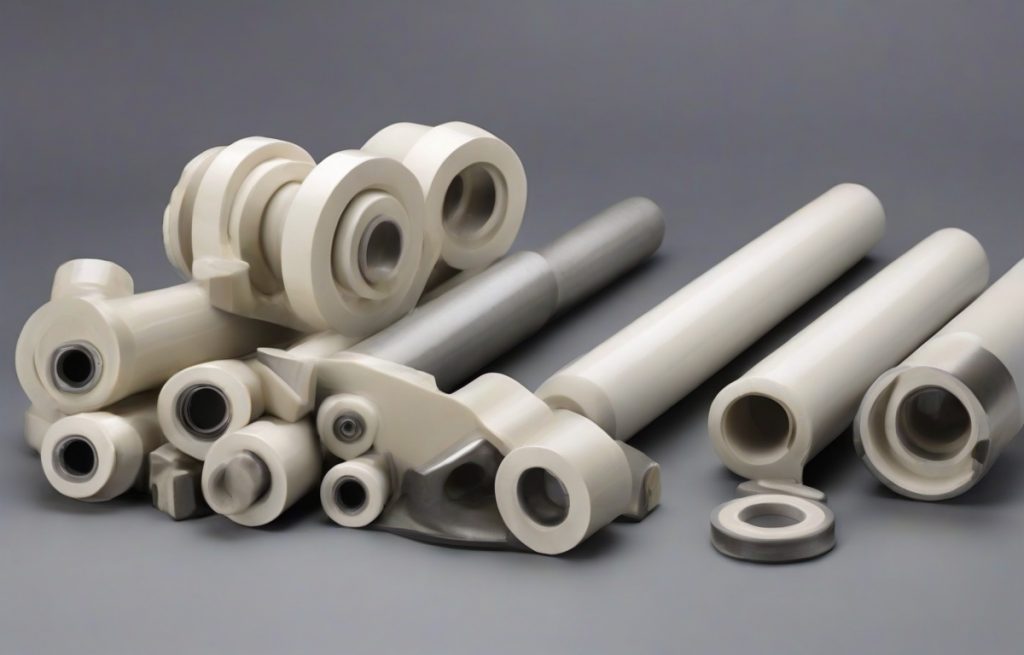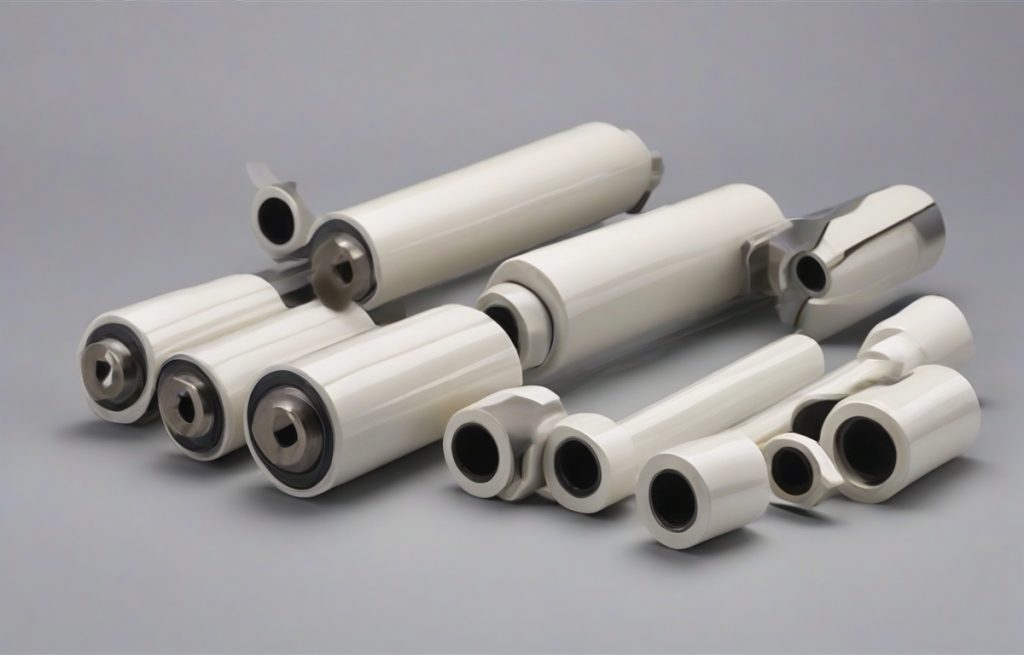Fused silica ceramic rollers are high-quality rollers made from fused silica ceramic material, used in various industrial applications due to their excellent heat resistance and durability. These rollers offer exceptional thermal stability, low thermal expansion, and superior mechanical strength, making them ideal for applications such as glass manufacturing, metal processing, and heat treatment processes.

With their unique properties, fused silica ceramic rollers ensure precise and efficient performance under high-temperature and corrosive environments. They are widely sought after for their ability to withstand extreme temperatures and provide consistent performance, making them a reliable choice in demanding industrial settings.
Their superior quality and performance make them an indispensable component in various industrial processes.
Understanding Fused Silica Ceramic Rollers
Fused Silica Ceramic Rollers provide a durable and high-performance solution for various industrial applications. These rollers offer excellent thermal stability, precision, and wear resistance, making them ideal for use in glass, steel, and semiconductor industries.
Understanding Fused Silica Ceramic Rollers Fused Silica Ceramic Rollers are an important component in many industrial processes, particularly in high-temperature applications. They offer unique properties and advantages that make them highly desirable in various industries. In this section, we will delve into the definition and composition of Fused Silica Ceramic, as well as explore the properties and advantages of Fused Silica Ceramic Rollers.
Definition And Composition Of Fused Silica Ceramic
Fused Silica Ceramic, also known as fused quartz ceramic, is a high-performance material that is made by melting silica or silicon dioxide (SiO2) at extremely high temperatures. This process results in a vitreous, non-crystalline material with excellent thermal and chemical resistance. The composition of Fused Silica Ceramic primarily consists of silicon and oxygen atoms arranged in a three-dimensional network structure, which gives it exceptional mechanical strength and stability.
Properties And Advantages Of Fused Silica Ceramic Rollers
Fused Silica Ceramic Rollers possess a range of exceptional properties, making them ideal for various industrial applications. Let’s explore some of these properties and advantages:
1. High Temperature Stability: Fused Silica Ceramic Rollers can withstand extreme temperatures up to 1200°C (2192°F), making them ideal for applications that involve high-temperature processes like glass manufacturing, thermal processing, and metal heat treatment.
2. Low Thermal Expansion: Fused Silica Ceramic has a very low coefficient of thermal expansion, which means it can withstand rapid temperature changes without cracking or warping. This property ensures dimensional stability and prevents damage during thermal cycling, making it suitable for applications that require precise control of dimensions.
3. Excellent Chemical Resistance: Fused Silica Ceramic Rollers are highly resistant to chemical corrosion and attack by acids, bases, and most chemicals. This property makes them well-suited for applications in the chemical industry, where exposure to aggressive chemicals is common.
4. Superior Surface Finish: Fused Silica Ceramic Rollers have a smooth and hard surface finish, which minimizes friction and allows for optimal performance in applications like glass tempering, metal sheet processing, and paper manufacturing.
5. High Strength: Despite its amorphous nature, Fused Silica Ceramic exhibits exceptional mechanical strength and durability. It can withstand high loads and maintains its structural integrity even under extreme conditions. This property ensures longevity and resistance to wear and tear.
6. Electrical Insulation: Fused Silica Ceramic is an excellent electrical insulator, making it suitable for applications where electrical conductivity needs to be minimized, such as in electronics manufacturing and high-temperature furnaces.
Applications Of Fused Silica Ceramic Rollers
Fused Silica Ceramic Rollers are versatile components used in various industries. Their exceptional properties make them the preferred choice for numerous applications. From glass manufacturing to steel and metal processing, as well as the printing and packaging industry, these rollers play a vital role in enhancing productivity and improving overall efficiency.
Glass Manufacturing
In the glass manufacturing industry, Fused Silica Ceramic Rollers are indispensable. Due to their excellent thermal shock resistance and high-temperature stability, they are used in the production of various glass products such as bottles, containers, and fiberglass. The rollers ensure efficient transportation of glass sheets through kilns and furnaces, enabling smooth and precise processing.
Steel And Metal Processing
Fused Silica Ceramic Rollers find extensive applications in steel and metal processing. Their exceptional hardness and wear resistance make them ideal for use in hot rolling mills, where they provide reliable support and guidance during the production of steel coils and sheets. These rollers can withstand extreme temperatures and heavy loads, ensuring smooth and uniform metal shaping.
Printing And Packaging Industry
When it comes to the printing and packaging industry, Fused Silica Ceramic Rollers are critical components in various printing processes. Their superior dimensional stability and surface finish enable high-quality printing results. These rollers are commonly used in flexographic, gravure, and offset printing machines, where they ensure precise ink transfer and consistent printing performance. Furthermore, their chemical resistance prevents ink contamination and extends the lifespan of the rollers.
The Future Of Fused Silica Ceramic Rollers

Discover the promising future of fused silica ceramic rollers that offer high durability, exceptional heat resistance, and improved production efficiency in various industries. Experience the benefits of this advanced technology, revolutionizing manufacturing processes worldwide.
Advancements In Manufacturing Techniques
Fused silica ceramic rollers have been revolutionizing various industries with their exceptional properties and performance. As experts delve deeper into research and development, exciting advancements in manufacturing techniques are paving the way for even more innovative uses in the future.
One of the most significant breakthroughs in manufacturing techniques is the development of advanced molding processes. Traditional manufacturing methods often posed challenges in achieving complex shapes and maintaining dimensional accuracy. However, with the integration of cutting-edge technologies, including computer-aided design (CAD) and computer numerical control (CNC), manufacturers can now produce fused silica ceramic roller with intricate geometries and precision engineering.
Moreover, novel sintering techniques have led to enhanced material properties and structural integrity. By carefully controlling the sintering process, it is possible to achieve uniform grain structures and eliminate defects, resulting in rollers with exceptional mechanical strength and thermal stability.
Potential Applications In Emerging Industries
The versatility of fused silica ceramic roller opens up a wide range of potential applications, especially in emerging industries that demand high-performance materials. Here are a few areas where these rollers are poised to make a significant impact:
Aerospace and Defense
- Within the aerospace and defense sector, fused silica ceramic roller can be utilized in engine systems, where they provide excellent thermal shock resistance and corrosion resistance, ensuring the smooth operation of critical components.
- Furthermore, their exceptional wear resistance makes them well-suited for applications in jet engines, where they can withstand extreme temperature differentials and exposure to abrasive environments.
Energy Storage and Batteries
- The increasing demand for energy storage and batteries requires materials that can withstand harsh conditions and provide long-lasting performance. Fused silica ceramic roller possess high electrical insulation properties, making them ideal for use in battery manufacturing processes that involve heat treatment and annealing.
- With their excellent thermal stability and chemical resistance, these rollers can also be employed in advanced energy storage systems such as molten salt batteries or high-temperature electrochemical cells.
Microelectronics
- As microelectronic devices continue to shrink in size and increase in complexity, manufacturers seek materials that can support the production of intricate circuits and MEMS (microelectromechanical systems). Fused silica ceramic roller offer the desired dimensional stability and outstanding electrical insulation required for advanced microelectronic manufacturing processes.
- Their compatibility with high temperature and vacuum environments makes them suitable for deposition processes during the fabrication of thin films and semiconductor devices.
The future of fused silica ceramic roller is undoubtedly promising, with ongoing advancements in manufacturing techniques and their potential applications in emerging industries. These rollers are poised to play a crucial role in pushing the boundaries of technological innovation, enabling industries to achieve higher levels of performance, efficiency, and reliability.
Frequently Asked Questions On Fused Silica Ceramic Roller
What Is Fused Silica Used For?
Fused silica is commonly used in various applications due to its high heat resistance and transparency. Its uses include optical fibers, semiconductors, precision instruments, and high-temperature resistant ceramics.
Is Fused Silica The Same As Quartz?
Fused silica and quartz are not the same, although they share similarities. Fused silica is a processed form of quartz with a high purity level and exceptional optical qualities. Quartz is a naturally occurring mineral.
Is Fused Silica A Ceramic?
Yes, fused silica is considered a ceramic material. It is made by melting pure silica and then rapidly cooling it, resulting in a transparent and amorphous (non-crystalline) solid. This material has excellent temperature resistance and is often used in applications such as optical fibers and high-temperature laboratory equipment.
Is Fused Silica Very Stable?
Yes, fused silica is highly stable due to its low coefficient of thermal expansion and resistance to chemical corrosion. Its stable nature makes it suitable for various applications requiring high temperature and chemical resistance, such as optical lenses and laboratory equipment.
What Are Fused Silica Ceramic Rollers Used For?
Fused silica ceramic rollers are commonly used in high-temperature applications such as glass manufacturing and steel production due to their excellent thermal stability and low thermal expansion properties. They provide precise control and smooth movement during the manufacturing process.
Conclusion
Fused silica ceramic roller offer numerous advantages in various industrial applications. With their exceptional thermal and chemical resistance, high strength, and precise dimensional stability, they ensure improved performance and efficiency. Whether in the glass, steel, or aluminum industries, these rollers provide reliable and long-lasting solutions.
Their suitability for high-temperature environments and resistance to wear and corrosion make them a valuable choice for optimizing production processes. Embracing fused silica ceramic roller can lead to enhanced productivity and cost savings, making them essential components in many manufacturing operations.
Post time: 12 月-18-2023
